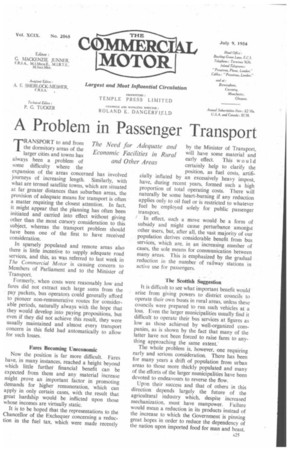A Problem in Passenger Transport
Page 27

If you've noticed an error in this article please click here to report it so we can fix it.
TRANSPORT to and from the dormitory areas of the larger cities and towns has always been a problem of some difficulty where the expansion of the areas concerned has involved journeys of increasing length. Similarly, with what are termed satellite towns, which are situated at far greater distances than suburban areas, the provision of adequate means for transport is often a matter requiring the closest attention. In fact, it might appear that the planning has often been initiated and carried into effect without giving other than the most cursory consideration to this subject, whereas the transport problem should have been one of the first to have received consideration.
In sparsely populated and remote areas also there is little incentive to supply adequate road services, and this, as was referred to last week in The Commercial Motor is causing concern to Members of Parliament and to the Minister of Transport.
Formerly, when costs were reasonably low and fares did not extract such large sums from the pay packets, bus operators could generally afford to pioneer non-remunerative routes for considerable periods, naturally always with the hope that they would develop into paying propositions, but even if they did not achieve this result, they were usually maintained and almost every transport concern in this field had automatically to allow for such losses.
Fares Becoming Uneconomic Now the position is far more difficult. Fares have, in many instances, reached a height beyond which little further financial benefit can be expected from them and any material increase might prove an important factor in promoting demands for higher remuneration, which can apply in only certain cases, with the result that great hardship would be inflicted upon those whose incomes are virtually static.
It is to be hoped that the representations to the Chancellor of the Exchequer concerning a reduction in the fuel tax, which were made recently by the Minister of Transport, will have some material and early effect. This would certainly help to clarify the position, as fuel costs, artificially inflated by an excessively heavy impost, have, during recent years, formed such a high proportion of total operating costs. There will naturally be some heart-burning if any reduction applies only to oil fuel or is restricted to whatever fuel be employed solely for public passenger transport.
In effect, such a move would be a form of subsidy and might cause perturbance amongst other users, but, after all, the vast majority of our population derives considerable benefit from bus services, which are, in an increasing number of cases, the sole means for communication between many areas. This is emphasized by the gradual reduction in the number of railway stations in active use for passengers.
The Scottish Suggestion It is difficult to see what important benefit would arise from giving powers to district councils to operate their own buses in rural areas, unless these councils were prepared to run such vehicles at a loss. Even the larger municipalities usually find it difficult to operate their bus services at figures as low as those achieved by well-organized companies, as is shown by the fact that many of the latter have not been forced to raise fares to anything approaching the same extent.'
The whole problem is, however, one requiring early and serious consideration. There has been for many years a drift of population from urban areas to those more thickly populated and many of the efforts of the larger municipalities have been devoted to endeavours to reverse the flow.
Upon their success and that of others in this direction depends largely the future of the agricultural industry which, despite increased mechanization, must have manpower. Failure would mean a reduction in its products instead of the increase to which the Government is pinning great hopes in order to reduce the dependency of the nation upon imported food for man and beast.




























































































